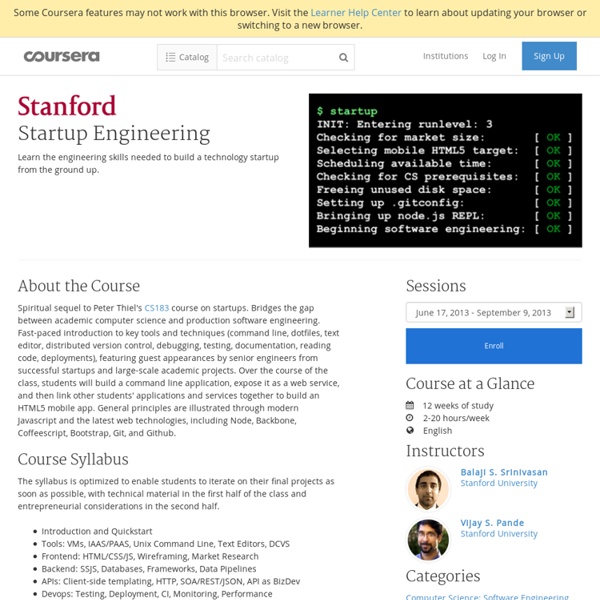Startup Engineering
About the Course Spiritual sequel to Peter Thiel's CS183 course on startups. Bridges the gap between academic computer science and production software engineering. Fast-paced introduction to key tools and techniques (command line, dotfiles, text editor, distributed version control, debugging, testing, documentation, reading code, deployments), featuring guest appearances by senior engineers from successful startups and large-scale academic projects. Over the course of the class, students will build a command line application, expose it as a web service, and then link other students' applications and services together to build an HTML5 mobile app. General principles are illustrated through modern Javascript and the latest web technologies, including Node, Backbone, Coffeescript, Bootstrap, Git, and Github. Course Format Grading will be based on multiple choice questions and programming assignments, and there will be a substantial final project.
Don’t build. Compose. — on startups
I was driving over the Bay Bridge recently while thinking about the product our company is developing, and trying yet again to somehow map the wild and woolly world of developing software to what feels to me to be the dominant paradigm people use in their mental model of it: civil engineering. It's everywhere in the language: we study software engineering, we do nightly builds, we think about our product architecture. The only problem is that it doesn't match with anyone's experience. You don't usually feel like you're “building” a product at all. There are no blueprints. So, here's the insight I'm currently tossing around in my head: The problem is that software isn't built; it’s written. Engineers are the authors. Product managers are the editors. Perhaps most importantly, the authors and editors need to work together to determine when the novel is finished. Product development is an art, and not a science. P.S.
iphone - How to create custom UIAlertView
Related:
Related:



